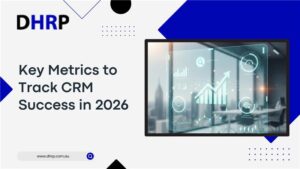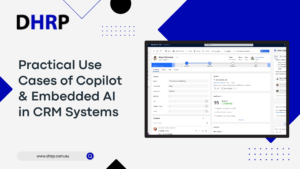In modern businesses, the ERP systems are the ecosystem of many organisations. When integrated into finance, logistics, procurement, HR, and operations, you can keep getting rid of data silos, limited transparency, manual processes, and vulnerability to fraud.
Blockchain technology is increasingly being viewed as the key to filling these gaps because of its decentralised and impenetrable digital ledger. Blockchain in ERP is setting a new benchmark by establishing transparency, automation, and trust in international supply chains.
So, now, before D365 implementation, you must know about the impacts of Blockchain in Dynamics 365 ERP.

Why Data Integrity with Blockchain in ERP Matters
- ERP solutions for Australian companies frequently cover manufacturing, supply chains, finance, regulations, and more; mistakes or manipulation in any of these areas can result in expensive compliance failures, harm to one's reputation, or monetary loss.
- Even with proper configuration, traditional ERPs typically rely on central databases, which adds risk in the form of opaque audit trails, fraud susceptibility, and single points of failure.
- The need for ERP systems that integrate blockchain technology to improve data security, transparency, and process automation is growing, according to British and international research (including a 2024 literature review of 66 scholarly publications).
How Smart Contracts & Decentralised Ledgers Improve ERP
Function Area | How Blockchain Enhances It | Benefit for Data Integrity |
Supply Chain & Logistics | A permissioned blockchain records item movements, origin, and lot/batch data, while smart contracts initiate quality checks and status updates upon receipt of goods. | Complete traceability, unchangeable records, simpler recalls, and proof of origin are crucial for Australian farmers, miners, and food exporters. |
Finance & Auditing | Invoices, payments, ledger entries validated via smart contracts; immutable transaction history; automatic triggering of audit checkpoints | Decreased risk of financial record alteration, a clear audit trail, and a decrease in invoice fraud. |
Contracts & Compliance | Smart contract-encoded agreements (such as service level agreements and supplier contracts); automatically enforced compliance rules; dynamic triggers for penalties and bonuses, etc. | Fewer manual interventions; deterministic behaviour; reduced legal ambiguity |
What Blockchain Brings to ERP: ERP blockchain integration benefits
You might still be wondering what blockchain brings to ERP.
Here is what can happen:
1. Immutable and Transparent Records
Blockchain is a distributed ledger in which each transaction is safely documented and cannot be changed after the fact. This guarantees that supply chain updates, financial transactions, and compliance records in ERP systems are auditable and impenetrable.
Benefit: Increased trust between external partners and internal teams, which lowers fraud and disputes.
Impact: According to studies, blockchain-enabled ERPs cut audit-related expenses by 62% and documentation errors by 56%.
2. Smart Contracts for Automation
Self-executing agreements encoded into the blockchain are known as smart contracts. When ERP modules are integrated, they can:
- When the goods are received, automatically pay the supplier.
- During the procurement process, initiate compliance checks.
- Update inventory levels in real-time.
Benefit: streamlined processes, less paperwork, and quicker settlements.
Impact: Blockchain-based procurement procedures can reduce transaction costs by 40–60%, cut cycle times by 50%, and reduce invoice error rates from 30–40% to less than 2%.
3. Real-Time Supply Chain Visibility
ERP systems already give insight into internal operations, but they increase supply chain trust when paired with blockchain technology. Blockchain receives data from IoT-enabled devices (such as RFID and GPS), which ERP synchronises for end-to-end traceability.
Benefit: Improved demand forecasting, stronger inventory control, and a lower risk of counterfeiting.
Impact: It now takes 2.2 seconds (a 99.9% improvement) to verify provenance, compared to 3.1 days previously.
4. Enhanced Security and Compliance
Blockchain protects sensitive ERP data from unwanted manipulation by using consensus validation and cryptographic security. This is especially important in sectors where compliance is a must, such as pharmaceuticals, healthcare, and finance.
Benefit: Easier regulatory audits and a stronger cybersecurity posture.
Impact: Blockchain-based authentication can reduce fraudulent documentation by 45–55% and unauthorised access attempts by 65–75%.
Smart contracts in Dynamics 365 ERP: What to Know
Here’s how blockchain in Dynamics 365 ERP with smart contracts can work best for companies or ERP consultants utilising or planning Dynamics 365 ERP cloud:
- Processes like payment upon receipt, contract milestone validation, and late delivery penalties can all be automated with Dynamics 365 ERP's Smart Contracts. Blockchain platforms (permissioned or consortium networks) that communicate with D365 through APIs or middleware can be used to construct them.
- For Dynamics 365 blockchain integration, it is frequently necessary to design an architecture in which bulk data stays off-chain to maintain performance and control costs, while sensitive ledger data (such as financial entries) is hashed on the blockchain.
- Blockchain-aware data tracking can be integrated when moving from older systems, like when you need to migrate Dynamics AX to Dynamics 365. Hashing or verifiable logs can be used to evaluate and preserve historical data integrity, audit compliance, and contract validity.
- By comparing expected smart contract rules with actual data, AI in Dynamics 365 ERP automation, in conjunction with blockchain, can identify anomalies (fraud, data mismatches) or flag transactions that are not in compliance. By adding predictive and anomaly detection capabilities, artificial intelligence improves the deterministic behaviour of blockchain.
Use Case Examples from Australia
Some of the ERP solutions for Australian businesses that are already working at some level are:
- OpenSC: Although it is not a complete ERP, OpenSC (WWF Australia & BCG Digital Ventures) uses decentralised logs to track products through supply chains in order to verify sustainability claims.
- AgriDigital: Managing grain supply chains with blockchain technology, which lowers conflict between buyers, logistics companies, and farmers. illustrates supply chain blockchain in an environment with strict export regulations.
- Power Ledger: Blockchain facilitates the creation of automated contracts for peer trading, transaction validation, and settlements in P2P markets and energy trading. These projects demonstrate smart contract and ledger integrity in regulated markets, even though they aren't always closely related to an ERP.
Conclusion
The integration of blockchain in ERP is no longer a futuristic concept, but a present-day need for businesses seeking transparency, automation, and security. With smart contracts embedded into ERP systems, organisations can ensure compliance, streamline processes, and protect data integrity across supply chains, finance, and operations.
For companies considering Dynamics 365 implementation services, blockchain integration provides an edge by delivering immutable records, fraud resistance, and real-time visibility.
At DHRP, we help businesses leverage Dynamics 365 ERP with blockchain-enabled solutions to achieve trust, efficiency, and compliance, ensuring your ERP becomes a foundation for long-term growth and resilience.
FAQs
Blockchain in Dynamics 365 ERP enhances data integrity by creating immutable records, reducing fraud risks, and ensuring transparent, verifiable transactions across finance, supply chains, and compliance. This decentralisation prevents manipulation and strengthens trust among stakeholders.
Smart contracts automate ERP processes, enforce compliance, and create tamper-proof records. They minimise human error, speed up settlements, and ensure deterministic execution, significantly strengthening data integrity while improving efficiency, accountability, and trust in ERP operations.
In Dynamics 365 ERP, smart contracts enforce agreements automatically, validate milestones, trigger payments, and ensure compliance. They remove manual interventions, reduce disputes, and improve reliability, making ERP systems more transparent, efficient, and trustworthy for businesses.
Dynamics 365 blockchain integration improves business resilience by ensuring data transparency, strengthening cybersecurity, and reducing fraud. It enhances regulatory compliance, automates key processes, and builds trust across supply chains, finance, and operations, supporting sustainable business growth globally.



































































































